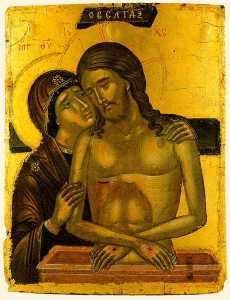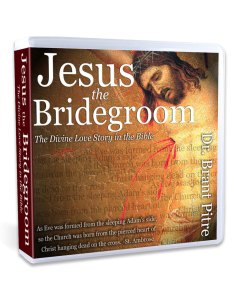 In our last reflection on “The Cross & the Mystic Mass of the Bride,” we saw how the soul-bride lives the perfect sacrifice of her personal cross every day: “… it [the soul] rests in perfect happiness [in the bridal chamber of the cross] and offers in its intimate sanctuary the mystic Mass of its loving sacrifice to ‘fill up what is lacking of the sufferings of Christ .”
In our last reflection on “The Cross & the Mystic Mass of the Bride,” we saw how the soul-bride lives the perfect sacrifice of her personal cross every day: “… it [the soul] rests in perfect happiness [in the bridal chamber of the cross] and offers in its intimate sanctuary the mystic Mass of its loving sacrifice to ‘fill up what is lacking of the sufferings of Christ .”
What she brings to the Church and to souls is incalculable because if she lives, indeed, in union with Christ completely abandoned to the Will of God in the Holy Spirit, she is living in the “eternal mode of prayer.” What does this mean?
In New and Divine: the Holiness of the Third Christian Millennium, by Hugh Owen, we learn from Venerable Luis Martinez, Blessed Dina Belanger, St. Theresa, Blessed Elizabeth of the Trinity, Blessed Conchita, St. Maximillian Kolbe and others of a new and divine level of holiness available to us, a way to live and pray “in the eternal mode.” Furthermore, this level of holiness and prayer is available to all who desire it and who actively seek it.
Let me cite some quotations here to make “the eternal mode” more clear. Owen tells us, “In the lives and writings of the exemplars, Jesus shows his willingness to open his Heart completely to all who abandon themselves to the reign of the Father’s Will through the Holy Spirit….On several occasions, Our Lord told the exemplars of the ‘new holiness’ that He had given them, the ability to do God’s will as He did it, in time and in eternity–‘on earth as in Heaven.’” [pp. 28, 31]
Owen: “Jesus told Blessed Dina Belanger that by abandoning herself to the Father’s Will through the Holy Spirit, she would allow Him to operate freely in her and with her, in eternity. In the “eternal mode,” she [and others] would be able to do those acts perfectly that Jesus had prepared for her with the Father and the Spirit before the creation of the world. Thus, they would be present to all souls, past, present, and future in all of their acts. Their smallest actions, performed together for the glory of the Father and for the good of all creatures, would influence all souls for good.” [p.36-37]
“Jesus told Blessed Dina: ‘I am letting you see the whole multitude of consecrated souls to the end of time, so that you will understand how even one soul completely given over to me can radiate on all the other souls. You can see that, through it, my rays reach out into the distance, far into the distance, to the furthest end, meaning that I am doing good until the end of time….If all consecrated souls refused me nothing, if they allowed me to act freely in them all the time, all other souls would be saved. Yes, all other souls would be saved.’ [p. 37]
It’s not clear what Dina or Jesus means by ‘consecrated souls,’ perhaps consecrated religious, because Dina was a member of a religious order; however, any soul which consecrates itself in union with Jesus to full abandonment to the Father’s Will in the Holy Spirit is actually and really consecrated. Consider any one of the varied Acts of Consecration, ”Act of Consecration to the Sacred Heart,” “Act of Consecration to the Holy Spirit,” etc., available in the rich tradition of the Church—all of which set aside as holy, as sacred to the use of God the soul consecrated in that act. While desirable, vows are not necessary for such a consecration. Venerable Conchita herself was a wife and mother, not a religious. So this level of consecration is clearly available to all.
“Blessed Dina explained that when He spoke of all souls Jesus usually showed her ‘all created souls, without distinction between the past, the present and the future, just as the Heart of Jesus saw them, since everything is present to Him.’ Through Blessed Dina’s writings, Jesus invites all souls to allow Him to act in and through them, universally.” [p.38]
Jesus also told Blessed Dina, “In consecrated souls in whom my hands are bound by threads, in whom consequently my Heart is wounded, my rays reach only some souls living in the world at the same time. In consecrated souls who refuse me only small things, you can see that my rays reach many other souls in the world and extend further. In consecrated souls that have abandoned themselves totally to me, in whom I can act freely, see how my rays reach all souls, even to the end of time.” [p.49]
We see here that what is most essential to the eternal mode of prayer [in addition to the actual consecration itself] is the sincere willingness of the soul to relinquish all unnecessary attachments, worldly or even spiritual. Not a thread should connect the soul to anything other than the pure Will of God in one’s life. Our obligations remain if we are wife, husband, mother, but the attachments do not. After all, the obligations of our states of life, our duties revealed in the sacrament of the moment, are themselves the flow of God’s Will in our individual lives.
The varied blesseds refer to a person living this state of life and prayer as a “living host”: “When a soul abandons herself to the Will of the Father through the Holy Spirit and shares in the eternally-present sufferings of Jesus, she becomes a ‘living host.’ Moreover, when she performs with Jesus the good acts He has prepared for her to walk in—in eternity, with the same universal intention that He had—that soul becomes a ‘living host,’ a ‘walking Eucharist’ [another Christ].” [p. 38] [Notice also that we do not just offer up, but suffer with.]
Venerable Conchita and Venerable Luis Martinez described this state as ”mystical incarnation.” Blessed Dina referred to it as “divine substitution.” Another definition: “United with Jesus in the Eucharist, the soul in the Divine Substitution becomes a ‘living host’ whose thoughts, words, and actions are offered to the Father together with those of Jesus, for the good of all souls, past, present, and future. As a ‘living host,’ the soul acts ‘in eternity’ so as to be able to enter into the actual sufferings of Jesus (rather than the pious remembrance or imitation of them), thus influencing souls at any point in time or space.” [p. 48]
Hugh Owen explains it this way, “Just as the Divine Will reigns in the consecrated Host—which nevertheless retains the accidental properties of bread–in a similar way, the Divine Will reigns in the soul who has received the Gift of the Mystical Incarnation or Divine Substitution, although the soul preserves her own human faculties. In the Eucharistic Host, the Divine Will and the human will of Jesus coexist. Through the Gift of the Mystical Incarnation or Divine Substitution, the Divine Will cooperates with the human will in the soul of a human being, in the same kind of way that it did in the soul of the Blessed Virgin Mary. “ [p. 46]
Hugh Owens comments that this level of union is probably “the fruitful stage” of the Mystical Marriage, where the bride-soul enters in the activity of the Bridegroom, Jesus, through a permanent union of wills. It is in the arms of her Bridegroom, from the bridal chamber of the cross, that the the soul-bride lives and prays in the eternal mode.
Prayer of Oblation to the Divine Will in the Holy Spirit of Venerable [Archbishop] Luis Martinez:
“’Oh Holy Father, oh Adorable Father,
through the immaculate hands of Mary, the Most Holy Virgin, my Mother,
under the impulse of the Holy Spirit,
and intimately united to Jesus, Your Son, Immortal Victim,
I give to You today the total gift, and the absolute oblation of myself,
abandoning all to Your sovereign Will,
in order that this Divine Will, without asking my opinion,
without taking me into account,
might do with me and with all that is mine, whatever it pleases…
My only support in making this oblation is Your strength,
upon which my nothingness rests….
I give You that which I can now give You:
my will, sincere and complete,
and I cast myself into Your sovereign Will.’
” I experienced something most profound, most strange, as if for my soul there began a new stage; as if in those moments I was given to the Holy Spirit, that He might ravish my soul and give it to Jesus. I understood that by this union, the Holy Spirit, as an impetuous wind, was to carry away my soul, stripping it of everything and plunging it into the bosom of God.” [p.28]
WHAT ARE SOME OF THE IMPLICATIONS OF PRAYER IN THE “ETERNAL MODE”?
Our spiritual lives have much deeper and more extensive power and influence than we ever dreamed.
Through the writings of Blessed Dina, we know that if we abandon ourselves fully in the Holy Spirit to the Divine Will, we can actually transcend time and space, living, sacrificing, and praying in the eternal mode in which we can touch and radiate all souls, past, present, and future. Because Jesus lives in the Eternal Now, united to His Sacred Heart, we live and work in Him in the Eternal Now.
Jesus told Venerable Conchita: “Know that in God there is no succession of acts. He operates eternally in one only act of His Will which covers all times and eternity, and all creations, all things in one only instant, the eternal instant of Unity in which is reflected and exists always present, past, and future….You must live in this essential Unity, in this Unique God, bringing together your spiritual life in one only Love: Him; in one only Will: His. In this capital point of unity of wills consists the perfection of this Unity.“ [p. 32]
The least thread of attachment lessens the effectiveness of our prayers and sacrifices.
Living our daily, ordinary lives with complete love and abandonment to God’s Will can make us holy beyond our wildest hopes. We can save thousands of souls for Christ without leaving our homes and families.
Finally, as Hugh Owens explains, “In the lives and writings of the exemplars, Jesus invites us to renounce the independent use of our human will and to ask the Holy Spirit to consecrate us into living hosts. Then the Holy Spirit will inspire us to do those acts of perfect love that Jesus has prepared for us in the secret recesses of his Heart. And if we allow Him a free reign, He may bring us to the point where we will always be doing the perfects acts of love that Jesus has prepared for us. Thus, we may become a ‘real presence’ of Jesus in the world, a ‘living Eucharist.’” [p.166]
In this Mystic Mass of the soul-bride, what is the offering? What is the sacrifice offered in the eternal mode? We may as well ask what is the Will of God for us. All that we are and all that we have in our ordinary life. The flow of duties of our state of life in the sacrament of every moment. It is the Hidden life: His hidden life in the Eucharist, and our hidden life every day. It is the little way of St. Theresa, doing all the little things with great love. In Love Crucified, A Simple Path to Union tells us: ” Through Me, with Me, and in Me your most ordinary life is the power of God.”

